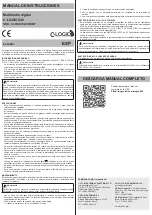
40
Maintenance and cleaning
General
To ensure the accuracy of the multimeter over an extended period of time, it should be calibrated once a
year.
Apart from occasional cleaning and fuse replacements, the multimeter requires no servicing.
Information on changing the battery and fuse appears below.
Regularly check the technical safety of the instrument and measuring lines, e.g.
check for damage to the housing or squeezing etc.
Cleaning
Always observe the following safety instructions before cleaning the device:
Live components may be exposed if covers are opened or parts are removed (unless
this can be done without tools).
The connected lines must be disconnected from the measuring device and all mea-
suring objects prior to cleaning or repairing the device. Switch the DMM off.
Do not use any carbon-containing cleaning agents or petrol, alcohol or the like to clean the product.
These could corrode the surface of the measuring instrument. Furthermore, the fumes are hazardous to
your health and explosive. Moreover, you should not use sharp-edged tools, screwdrivers or metal
brushes or similar for cleaning.
For cleaning the device or the display and the measuring lines, use a clean, fuzz-free, antistatic slightly
damp cloth.
Fuse replacement
The currency measuring ranges are protected against overload with ceramic fine-wire fuses. If measur-
ing in this range is no longer possible, you have to change the fuse.
Proceed as follows for replacement
-
Separate the connected measuring leads from the measuring circuit and the measuring device.
Switch the DMM off.
-
Unscrew the three screws on the back of the device and carefully pull the casing apart.
-
Replace the defective fuse with a new fuse of the same type and nominal voltage. The fuses have the
following values:
F1 fine-wire fuse, quick-action, 1A/250 V (6 x 25 mm). Common name F1A250V.
F2 fine-wire fuse, quick-action, 10A/250 V (6 x 25 mm). Common name F10A250V.
-
Now close the housing carefully again.
















































